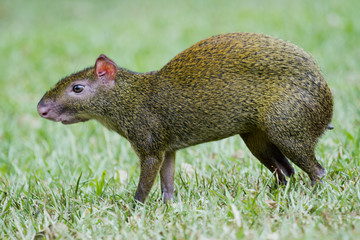ANIMAL: Brazilian/Red-Rumped Agouti Dasyprocta leporina Type of Animal: Cavy Habitat: Forests, gardens, farmland, swamps, savanna, thick brush, suburbs, scrub forest, grassland, riparian areas, scrubland Location(s): Venezuela, Guyana, French Guiana, Brazil. Introduced to Lesser Antillles. Appearance: Rump ranges in color from red to orange to gold or mix of these colors. Rather stocky build & looks like close relative, the Guinea Pig. Food/Diet: Seeds, fruit, leaves, nuts, roots, tubers, stems, grains, nectar, flowers, bark, wood, vegetables, fungi, crabs, insects Status in Wild: Stable Conservation: Breeding in zoos & wildlife parks. Bred for meat in some areas. Lifestyle: Small groups of a male w/ 1-2 females & young Additional Info: Called: Male-Boar Female-Sow Young-Pup Group-Herd Weight: Adult-6.6-10 lbs Young-0.5 lbs Gestation: 3.5-4 months Body Length: 1.6-2.1 ft Life Span: Up to 17 years Main predators are felids, canids, harpy eagles, crocodilians, & large snakes. Capuchins & dwarf caimans prey on young. They’re very territorial and often fight intruders to the death. Young often help younger siblings out. Pairs/trios have territories ranging from 30,000-85,000 square meters. Both sexes urine-mark territory & males urine-mark females during breeding season. When food plentiful, they often hide food for later in special areas. This indirectly causes plants to grow if they forget where food was put. Natives often hunt them for meat & to keep as pets. Can be found in human-inhabited areas when cover is available. Sexually mature at 1 year old. Also called the golden or orange rumped agouti. Called “cutia” in Brazil. Fun Fact(s): They can swim but they can’t dive. The hair smells like stinky oil. Can jump up to 6 ft in air from standing position, spin, land, & run in opposite direction. Only animal able to crack open shell of a brazil nut due to very strong front incisor teeth. Somewhat popular in pet trade but rather nervous, shy, & flighty. However, they’re non-aggressive.
